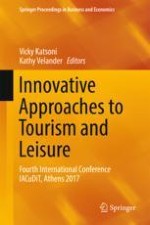2018 | OriginalPaper | Chapter
Human Development Tourism: Utilizing Cultural Heritage to Create a Universal Culture
Author : Anastasia Moira
Published in: Innovative Approaches to Tourism and Leisure
Publisher: Springer International Publishing
Activate our intelligent search to find suitable subject content or patents.
Select sections of text to find matching patents with Artificial Intelligence. powered by
Select sections of text to find additional relevant content using AI-assisted search. powered by
